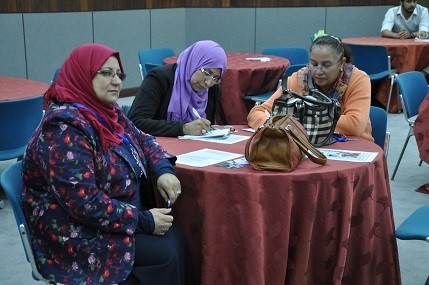
May 2014—Last month, Libya’s Constitutional Drafting Assembly (CDA) began the formidable task of outlining a set of principles for governing the country. With just five of the assembly’s 60 seats held by women, concerns abound that the voices of Libyan women will not be sufficiently heard during this important political conversation.
As part of efforts to ensure that Libya’s legislation reflects the will and needs of all Libyan people, USAID’s Office of Transition Initiatives recently teamed up with the women’s rights group Why Me to host a conference on women’s rights and the constitution.
The conference, which was held in Benghazi in April, brought together more than 70 prominent women leaders and activists from eastern Libya’s main cities, including Benghazi, Kufra, Derna, Bayda, Marj, Ajdabiya and Tobruk. It was headed by a panel of 20 women who participated in the CDA elections earlier this year, including two successful candidates who are now Assembly members.
Following a series of presentations, participants worked together in groups to draft recommendations for the CDA, highlighting main points necessary to advance women’s rights and political participation. For example, they called for a cap on campaign spending to ensure an even playing field for men and women during elections. They also recommended that the government actively encourage women to participate in political life, and that women who run for office without success receive training to build their campaigning skills in future elections.
One woman activist* from Derna—a coastal city notorious for its insecurity and extremist activity—reported on the challenges she faced while campaigning during elections for the General National Congress in 2012. Despite harassment from citizens, the destruction of campaign posters, and the pervasive threat of extremist violence, she refused to drop out of the elections.
Although she did not win, she decided to subsequently run for the Constitutional Drafting Assembly. As she explained to women at the conference, her intention in campaigning is not just to win, but to exercise her right as a Libyan citizen to run for political office: “I want to send a clear message. Libyan women are as capable and worthy as Libyan men. They can and should compete side by side for political positions in Libya today.”
Since the conference, members of Why Me have started building a coalition of women activists around eastern Libya. Their aim is to create an ongoing forum to ensure women’s voices are heard throughout the constitutional drafting process. The two CDA members who attended the conference were tasked with presenting the women’s recommendations to the Assembly.
USAID continues to support the work of women’s advocacy networks to help women effectively participate in Libya’s political transition.
*Name withheld to protect security.
Links







Comment
Make a general inquiry or suggest an improvement.